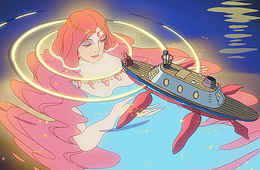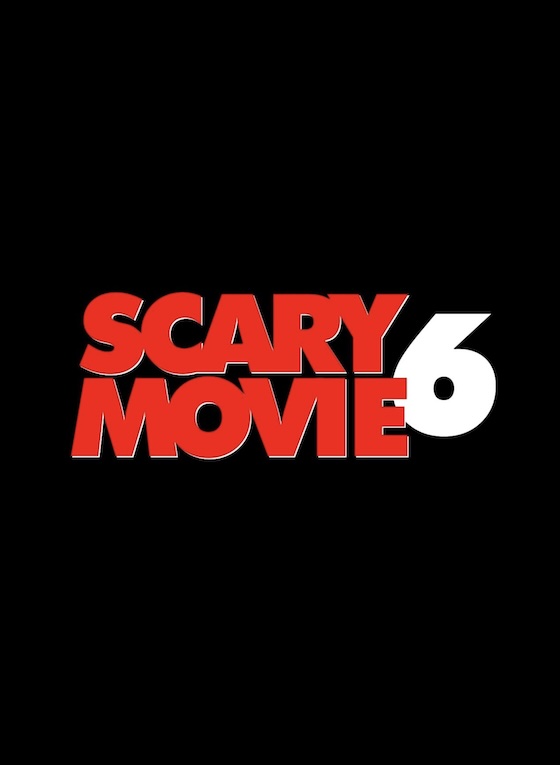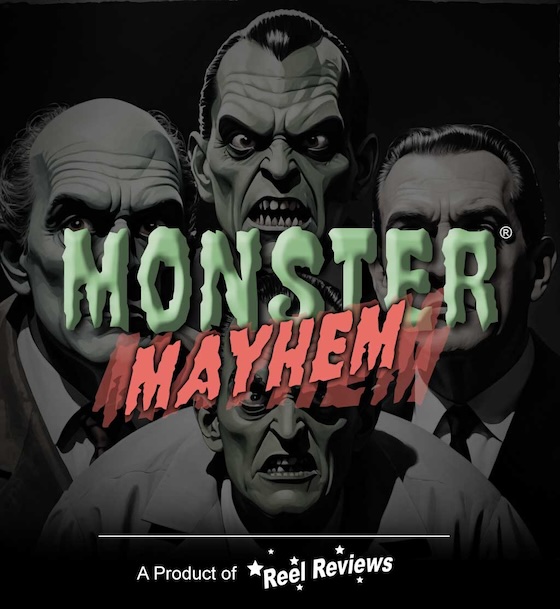{googleAds}
<div style="float:left">
<script type="text/javascript"><!--
google_ad_client = "pub-9764823118029583";
/* 125x125, created 12/10/07 */
google_ad_slot = "8167036710";
google_ad_width = 125;
google_ad_height = 125;
//-->
</script>
<script type="text/javascript"
src="http://pagead2.googlesyndication.com/pagead/show_ads.js">
</script></div>{/googleAds}Ponyo is Hayao Miyazaki's most joyous film since Porco Rosso, and the purest evocation of childhood he's done since My Neighbor Totoro. After flirting with darker and more surreal themes in the past several films since Princess Mononoke, he has returned to deliver a delightful film that entertained the young adult audience at the premiere and should please even the youngest children.
Ponyo represents the second Miyazaki film that is an adaptation (of sorts) this is his take on The Little Mermaid story of Hans Christian Andersen. (His last film, the somewhat disappointing Howl's Moving Castle, is an adaptation of the novel by Diana Wynn Jones.) Disney, of course, has already left a large stamp on the story themselves, and what Miyazaki contributes to his version is a somewhat different cultural sensibility to Disney's very American â"follow your dreams and discover your true self" spin on the tale. This one is more about learning to love someone unconditionally, no matter who or what form he or she is, and the blessing of the parents and of the older generation is key to the conclusion of the film. The moral of the story is simple and heartwarming, and delivered without the accretion of competing themes (like the anti-war themes of Howl, and the somewhat anti-climactic ending of Spirited Away). Perhaps the decision to aim this film at young children helped Miyazaki focus.
Ponyo, the â"Ariel" of this story who starts as a goldfish and becomes a three- or four-year-old girl, is Miyazaki's most charming little child since Mei, the little sister in Totoro. Even with the dub, it was apparent from the writing and the script that he has not lost his feel for capturing the moods and movements of little children. The main boy, Sousuke, acts a little older than Ponyo, is voiced by a Jonas brother and also does a fine job capturing the natural curiosity and adventurousness of a boy his age. It's interesting how though the title of the movie is ostensibly about Ponyo, in many ways the film is more about him and his mother (voiced by Tina Fey), and the choices they make. The plot hinges on his decisions, and it is he who sometimes has to comfort his mother as his father is a bit absentee. As for music and animation quality: the Joe Hisaishi soundtrack is, for some reason, more soaring than usual, and perhaps the best phrase I can think of to describe the feel of this movie is â"cute grandeur." Many choral scenes abound, as well as beautifully animated underwater scenes that teem with jellyfish, fish, manatees, and a huge variety of sea creatures. (In some ways this feels like both an homage to similar famous scenes in Disney's The Little Mermaid as well as Pixar's Finding Nemo.) The animation actually feels simpler than the overly elaborate sets of both Howl and Spirited Away; Miyazaki proudly and defiantly noted in his introduction at the premiere that this movie was all produced by a pencil in 2D, and that he wanted computers to completely stay out of it. He might have been a little grumpy in saying it, but I have to say: it works. It is a work of visual beauty, replacing the flight scenes for which he is famous with underwater footage that is utterly unique and captivating, and above all, alive. No less than John Lasseter, the head of Pixar and Disney Animation, said that he has never seen water animated such before.
As for music and animation quality: the Joe Hisaishi soundtrack is, for some reason, more soaring than usual, and perhaps the best phrase I can think of to describe the feel of this movie is â"cute grandeur." Many choral scenes abound, as well as beautifully animated underwater scenes that teem with jellyfish, fish, manatees, and a huge variety of sea creatures. (In some ways this feels like both an homage to similar famous scenes in Disney's The Little Mermaid as well as Pixar's Finding Nemo.) The animation actually feels simpler than the overly elaborate sets of both Howl and Spirited Away; Miyazaki proudly and defiantly noted in his introduction at the premiere that this movie was all produced by a pencil in 2D, and that he wanted computers to completely stay out of it. He might have been a little grumpy in saying it, but I have to say: it works. It is a work of visual beauty, replacing the flight scenes for which he is famous with underwater footage that is utterly unique and captivating, and above all, alive. No less than John Lasseter, the head of Pixar and Disney Animation, said that he has never seen water animated such before.
The premiere we watched is of the American dub, which features prominent A-list voice talent: Liam Neeson plays Ponyo's father, Cate Blanchett as her mother, and Sousuke's mother is played by Tiny Fey. Liam Neeson's gravelly, British-accented voice works for the most part, though the way he delivers some of his lines about â"bringing balance to the earth" sound faintly outlandish. Cate Blanchett doesn't say too much, and as her character actually bears some resemblance to Galadriel in Lord of the Rings, her strikingly similar performance fits.
Tina Fey, alas, was somewhat disappointing. I say this as a fan of her work in 30 Rock. It may be due to my love of that show and my filtering of her voice through the lens of Liz Lemon, but I had some difficulty quite fully believing in her as the mother that seems to be portrayed in the film. There were moments where she sometimes seemed to be underacting (rather than overacting as many American dub actors are wont to do), not seeming to put a lot of emotion into her voice when the lines called for it. In one very memorable, hilarious scene involving Morse code signal lights, however, the Fey of â"WHERE S MY SANDWICH?" came out, and it was a delight to hear the unmistakable timbre of her comedic voice come out. The mother, Lisa, of the story is a richly drawn and believable character devoted to service in taking care of the women at the old folks home, she is trying hard to balance work and home life, becomes exasperated and frustrated at times with her sailor husband, and tries her best to take care of both Sousuke and Ponyo accepting Ponyo with surprising ease when she becomes a little girl. I felt Fey got 90% of the way there but was just a little off at times. Maybe it was the pressure of recording for Ponyo during the day, and being Sarah Palin on SNL at night (as I heard on Daily Variety)? Those are two very different characters!
Obviously, this film deserves a rewatch with the original Japanese audio and subtitles to see at least how Miyazaki imagined these characters sounding. However, the story and the core of the film was communicated more than adequately through the professional dub and it did not get in the way of the sheer delight and joy that Miyazaki wanted to convey. The family film is often maligned for being only suitable for kids, not least because it often talks down to them and throws bones to the adults in the form of cheesy pop culture references. Miyazaki has never trafficked in such things he has always spoken to children at their level better than almost any filmmaker and Ponyo shows that age has not tempted him in the least in that direction. May he never do so, or else we will not have treasures like this gem of a movie to make us all like giddy five-year-olds again.
|
||||||||||||||||||
DVD Details:
Screen Formats: 1.85:1
Subtitles: English, French, Spanish
Language and Sound: English: Dolby Digital 5.1Japanese: Dolby Digital 5.1French: Dolby Digital 2.0 Stereo
Other Features: Color; interactive menus; scene access; Meet Ponyo - introduction by the producers.
{pgomakase}



































